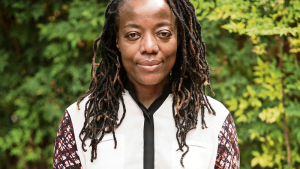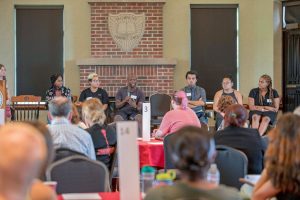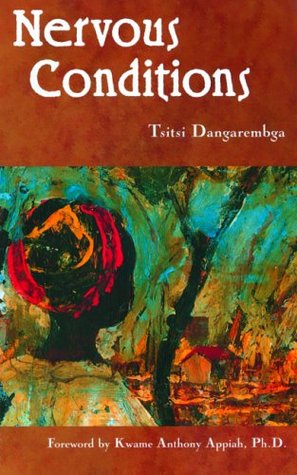
Tsitsi Dangarembga, Author of Nervous Conditions
On a warm evening in early September, approximately eighty Ohio Wesleyan Students and eighty faculty members gathered in the Benes Rrooms for the school’s first Diversity Summit. The two dozen round tables were littered with small yellow pads and pens, boxed dinners, and signs with labels proclaiming such topics as “coalitions across student groups,” “Faculty and Staff collaboration,” and “Intersectionality.” Central to the event was a panel of eight student representatives, who discussed key issues regarding OWU’s level of inclusion. Sarah Mattick, who is Chinese American but grew up in a mostly white community, said something that struck me: “When I was little I didn’t notice a lot of the racist things people would do. It wasn’t until I grew up and looked back on those things that I realized how much all of those microaggressions had affected who I was.”
This confession reminded me of an excellent novel I had to read for Dr. Nancy Comorau’s class “Reading the Global Kitchen.” Set in 1960s Rhodesia, Nervous Conditions by Tsitsi Dangarembga follows the early life of Tambu, a Rhodesian girl with a burning desire for education. It is narrated in the voice of her older, more embittered self, who is looking back at the events of her younger years. She retrospectively shows us, the readers, the ways in which the actions and expectations of her family members affected her development in ways she has only now, years later, come to understand. Like Sarah Mattick, it is only with hindsight that Tambu can see the profound effect that everyday instances of colonial and patriarchal control have had on the shaping of her identity.
But we the readers are not hit over the head with such epiphanies. Dangarembga, with true brilliance and craft, keeps us suspended somewhere between young Tambu’s rather more innocent impression of people and events and older Tambu’s cynical, mature outlook on things. Through the use of subtly placed details, juxtaposition of images, and alternation between a neutral, straightforward tone and one of heavy sarcasm and simmering anger, Dangarembga is able to suggest that the narrator has a different impression than her younger self. It is in being forced to dwell in this ever-shifting space between the two perspectives that the reader is able to discover for themselves the terrible power and influence of the micro and macro aggressions directed at and witnessed by Tambu. And it is within this space of “half-awareness” that Dangarembga masterfully captures those creeping sensations of unease and self-doubt experienced by most everyone who has ever been routinely subjected to repression of their identity.

It wasn’t just Sarah Mattick who confessed that the actions and opinions of the members of her community negatively shaped her sense of self. Many of the panel members included examples of such instances in their daily lives at school, whether they were being harassed at a cafe for being black or having to deal with casually insulting comments about women’s sexuality in class. Looking back at my own experience of growing up female, I can feel the accumulative weight of the implicit messages lurking behind comments like, “don’t cut your hair, it won’t look feminine,” “if you’re too good at things, boys will be intimidated and won’t like you,” and “you sure like to talk a lot,” as well as the daily discomforts of being catcalled and appraised, physically picked apart, so that I felt the need to calculate meal sizes and ration desserts. All of these unsolicited comments on my appearance and “corrections” to my behavior have resulted in a general nervousness about being a woman, a tenseness that subtly affects my decisions. From this tension has come a wealth of self-inflicted rules to hold myself in place, in the position that will garner me the least amount of criticism, both from myself and from others.
The impossibility of my living up to this ever-looming standard for “woman-ness” calls back to something Tambu’s uncle tells her when she first comes to live with him: “I was an intelligent girl but I had also to develop into a good woman, he said, stressing both qualities equally and not seeing any contradiction in this” (89). In Tambu’s case, the contradiction she is being forced to embody is to be both an excellent student, thereby justifying her occupation of a much sought-after position in her uncle’s missionary school, which necessitates that she be analytical, curious, and critical of the world around her, and to also be a “proper” young woman, meaning silent, obedient, and servile. Her commitment to this double standard causes her to develop a hoard of unhealthy, repressive tendencies, and eventually leads to a mental breakdown.
Tambu’s progression from a determined and hopeful child to a repressed young adult contains echoes of the experience of many people at the Diversity Summit, including Sarah’s and my own. In the beginning of Nervous Conditions Tambu proves her mettle when, at the tender age of eight, she grows her own crop of “mealies” (corn) with which she is able to pay the school fees that her overworked mother and indolent, unintelligent father are unable to provide for her. In a weird mix of tragic and fortunate, Tambu’s older brother Nhamo dies, enabling her at the age of fourteen to continue her education at her uncle’s missionary school in her brother’s place.
At first, I was swept up in her triumph: “She’s getting an education,” I crowed with delight, “how wonderful!” like Tambu, naively believing that once she attained her education, she would be a free woman. But I came to realize that the structures holding Tambu back couldn’t be overcome with education alone, that even the source of her educational opportunity, her Uncle Babamukuru, who as a child Tambu described as “God-like,” saintly, and faultless, is actually her greatest obstacle to freedom. This fact is epitomized in the moment when Babamukuru beats his outspoken daughter Nyasha for staying out an extra ten minutes to talk to a boy after a school dance, shouting,“How can you go about disgracing me? Me! Like that! No, you cannot do it. I am respected at this mission. I cannot have a daughter who behaves like a whore” (pg 116). The real reason he hits Nyasha is not that she came back late, but because she stands up for herself, truthfully denying that she did anything wrong. This vocal objection to injustice is Babamukuru’s tipping point. It becomes clear in this moment that Tambu’s uncle cares more about controlling the behavior and sexuality of his daughter than loving her, and that Tambu could just as easily be cast aside, branded an “indecent, ungrateful” girl for a small act of individuality. Her educational opportunity is revealed as conditional, subject to a strict adherence to Babamukuru’s expectations for her behavior, which at its most basic involves never defying him in any way.
What made this moment so moving for me as a reader, made me stop, put down the book, and actually cry, was that Tambu has an epiphany that all conflicts in her past “came back to this question of femaleness. Femaleness as opposed and inferior to maleness,” and that “even heroes like Babamukuru” performed this victimization of women. And instead of reevaluating her opinion of Babamukuru, instead of condemning him or expressing anger or betrayal, she opts to shut down her own train of thought, which brings us to this heartbreaking passage:
If I had been more independent in my thinking then, I would have thought the matter through to a conclusion. But in those days it was easy for me to leave tangled thoughts knotted, their loose ends hanging. I didn’t want to explore the treacherous mazes that such thoughts led into. I di
dn’t want to reach the end of those mazes, because there, I knew, I would find myself and I was afraid I would not recognize myself after having taken so many confusing directions. I was beginning to suspect that I was not the person I expected to be…I took refuge in the image of the grateful poor relative. That made things a lot easier. It mapped clearly the ways I could or could not go, and by keeping within those boundaries I was able to avoid mazes of self-confrontation.” (pg 118)
What brought tears to my eyes was that Tambu, just like the older women in her life, is forced to choose between self-acknowledgment and self-preservation. And just like the women before her, she chooses security. Our gritty eight year old, who woke up before the sun to plant the seeds her mother gave her, who ignored her father’s insistence that she couldn’t “cook books and feed them to her husband” (pg 15), who tackled her brother Nhamo when she found out he was stealing her precious crop of mealies to feed to his friends, this girl has grown into a young woman who chooses silence in the face of her own repression, even within the confines of her mind.
That’s the best damn portrayal of the devastating effect of social conditioning that I’ve ever seen. It certainly struck a chord in me. It made me wonder, am I too keeping myself suspended in half awareness because I am afraid of seeing myself? Afraid of acknowledging the nature of the structural webs I’m caught in, because I know I couldn’t really do much about it? Or am I in fact very aware, like older, narrator Tambu, so aware that my anger and cynicism bleed into other aspects of my life? Tambu’s words reminded me of a line from Simone de Beauvoir’s book, The Second Sex, in which Beauvoir describes how internally alienating it can be for women to occupy the role of “woman”: “her body does not seem to her to be a clear expression of herself; within it she feels herself a stranger.” I cried when reading that passage as well. That has to mean something.

OWU Diversity Summit
Which brings me back to that day in early September. What was the value in our Diversity Summit? How much will we really change as a result of this event? The problems we face are historical and structural. We have to admit that curricula generally take years to evolve, faculty in charge of hiring new professors are often old and more conservative, and unless something traumatic happens, the larger population of OWU is unlikely to address our collective failings and to make individual commitments to progressive ideals.
But what is of value is the vocalization of our struggles, the group validation of our identities. Our professors might not choose (or in some cases might not be able) to drop everything to incorporate more women’s voices in history or talk about the accomplishments of black mathematicians. But at least we’ve been able to reassure one another that we’re not crazy, that something is wrong. There is value in realizing that we all suffer from nervous conditions, brought about by the cumulative effect of a lifetime of microaggressions and self-policing. This is the true purpose behind the relating of Tambu’s story. After she discovers that her cousin Nysha, from the combination of her uncles’ abusive behavior and her own extremely high expectations for her academic performance, has developed anorexia, Tambu begins to mistrust the system that she has been conditioned to inhabit and tells the reader,
I was young then and able to banish things, but seeds do grow…Quietly, unobtrusively and extremely fitfully, something in my mind began to assert itself, to question things and refuse to be brainwashed, bringing me to this time when I can set down this story. It was a long and painful process for me, that process of expansion. (208)
It is the act of telling her story that allows older Tambu to reclaim that part of herself that she kept locked in silence for all those years.
Nervous Conditions won the Commonwealth Writers Prize in 1989, only a year after it was published. It was the first novel by a black female from Zimbabwe to be printed in English, and in 2018 it was put on BBC’s top 100 books that have shaped the world. We know Tambu’s story continues in the novel The Book of Not, which was published in 2006, eighteen years after the first. I haven’t read it yet, but I hope to. I’m curious to know if Tambu makes the most of her burgeoning awareness. As we step away from the Diversity Summit, we will see whether our campus can as well. If this book’s world-wide reception and my own profound reaction to it are anything to go by, there is great power in the act of naming a problem, in the process of self-acknowledgment and discovery inherent to storytelling. The power contained in Tsitsi Dangarembga’s book makes me optimistic for our own prospects for change.

